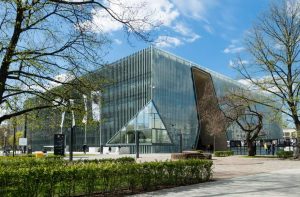Poland Liaison
Orator: Professor Dariusz Stola
is committed to establishing contact at all levels with, disseminating current information about,
and assisting, in any way possible, the Jewish Community of Poland.
DO YOU OR YOUR FAMILY
HAVE ROOTS IN …
ALEKSANDRÓW KUJAWSKI
His project, “Neighbours”, is aimed at showing the contribution Jews made to the town’s culture and economy.
Zbigniew seeks to contact anyone who can provide memoirs or other documentation to help preserve the memory of this town’s Jewish community.
Please contact:
Zbigniew Sołtysiński
puszczyk.sowa@interia.eu
Tel: +48 604 270 714
GRODZISK MAZOWIECKI
Material is already on display in the town’s cultural centre.
They seek more documents, photographs, momoirs or anything that will help preserve the memory of this pre-War Jewish community.
Please contact:
Anna Grzegorzewska
anna.grzegorzewska@gmail.com
Since the fall of communism in 1989, the Jewish Community in Poland has been gradually re-emerging and, today, is enjoying a revitalisation. Some estimates put the size of the Jewish community as high as 30,000.
With a new democratic and more liberal Poland, people who had previously hidden their Jewish identity are now acknowledging themselves as Jews and, every day, more people are discovering their true background which had hitherto been hidden from them for numerous reasons.
As well as in Warsaw, Kraków, Wrocław and Łódż, Jewish communities are now active in many other cities around Poland. In Częstochowa, Lublin, Gdańsk, Poznań, Bielsko Biała, Katowice and many other places, Jewish communal activity has re-emerged and is growing.
But, unlike us in Australia, with a Jewish communal infrastructure that is the envy of the Jewish diaspora around the world, every little bit of Yiddishkeit and every stage of growth in Jewish communal life in Poland can still be a struggle.
 One of our major tasks will be to support and promote the POLIN Museum of the History of Polish Jews, constructed on the site of the ghetto in Warsaw and officially opened in early 2014. Naturally, much has been established to memorialise the horrific events and consequences of the Holocaust. However, this Museum will be dedicated to documenting Jewish life in Poland over 700 years – before and after World War II. Jews contributed much to Polish society over the centuries – in science, medicine, law, literature, as artists and as educators.
One of our major tasks will be to support and promote the POLIN Museum of the History of Polish Jews, constructed on the site of the ghetto in Warsaw and officially opened in early 2014. Naturally, much has been established to memorialise the horrific events and consequences of the Holocaust. However, this Museum will be dedicated to documenting Jewish life in Poland over 700 years – before and after World War II. Jews contributed much to Polish society over the centuries – in science, medicine, law, literature, as artists and as educators.
This rich history must be preserved – and for that reason, the POLIN Museum is vitally important.
Polish-Jewish dialogue in Poland today is growing, particularly among the post-communist, educated young. There is a growing understanding and acceptance of the past, both the good and the bad. A new spirit of positive co-operation has emerged. Young Catholic Poles, more than ever before, are expressing an interest in the Jewish history of their country. This dialogue and interest needs to be nurtured and encouraged.
All too often today, Poland is depicted as being merely the largest Jewish graveyard in history. That is true – it IS the largest Jewish graveyard in history, But, today, it is MUCH MORE than that. It is home to a modern, growing Jewish community that will not, and should not, be ignored. We are fortunate to be living within the Australian Jewish community. However, what goes with that is an obligation to support our fellow Jews in Poland.
If you are interested in becoming involved in this part of the ASPJ’s activities, please contact Andrew Rajcher +61 (0)417 013 690 or email aragorn@axiomcs.com.au.
